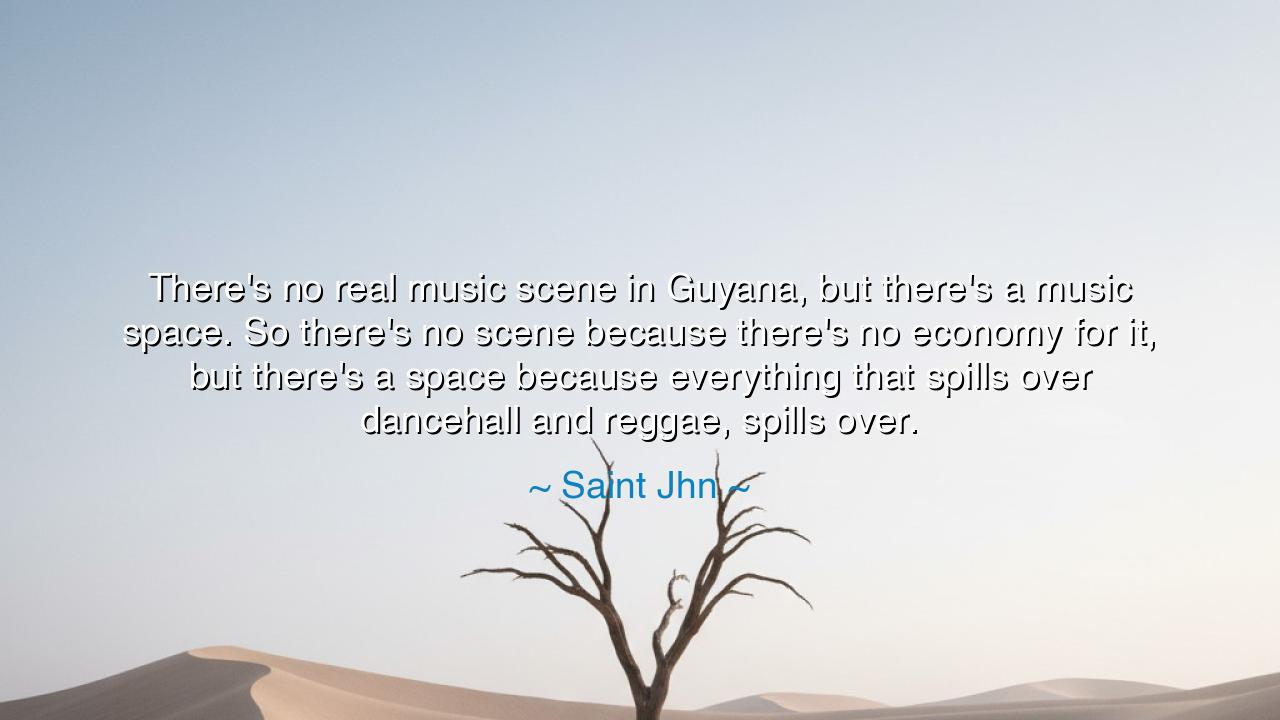
There's no real music scene in Guyana, but there's a music space.
There's no real music scene in Guyana, but there's a music space. So there's no scene because there's no economy for it, but there's a space because everything that spills over dancehall and reggae, spills over.






In the ebb and flow of culture, there are places where the waves of art and expression reach the shore, yet do not crash with the intensity of a scene. Saint Jhn reflects on this complex relationship between space and economy in his words: “There’s no real music scene in Guyana, but there’s a music space. So there’s no scene because there’s no economy for it, but there’s a space because everything that spills over dancehall and reggae, spills over.” These words reveal a deep truth about how culture, even when it lacks the infrastructure or support to thrive as an official scene, can still exist and make its mark in the form of a space—a place where ideas and sounds intermingle, where the heartbeat of a nation’s musical identity pulses quietly beneath the surface.
The ancients understood that art and culture do not always emerge from a place of prosperity, but often from places of lack. Consider the Greek philosophers, who, despite being part of a society with a flourishing artistic and intellectual economy, lived in times of both peace and turmoil. Their ideas did not always have the support of grand institutions, yet they found the space to explore truth, beauty, and justice. Similarly, the world’s great poets, artists, and thinkers often rose from the most humble of beginnings, creating in the cracks and crevices of society, using music, words, and art to transcend the barriers around them. Even in the absence of an official scene, creativity can still find a way to thrive, as Saint Jhn implies about Guyana.
In the same way, Guyana’s musical identity—its space—is nurtured not by a robust economy of the arts, but by the spills from dancehall and reggae—musical genres born from a different place, yet undeniably connected. These genres, birthed in the islands of the Caribbean, have traveled the world, transcending borders and reaching distant shores. The spillage of these influences represents a kind of cultural osmosis: what begins as a local movement spreads, slowly infiltrating other spaces, enriching them with new rhythms and voices. In Guyana, as Saint Jhn points out, this spillover creates an informal space for music to exist—a fluid environment where the influence of dancehall and reggae echoes, even though the formal infrastructure to support it is lacking.
Let us consider the reggae music of Bob Marley, which began as a sound in the streets of Jamaica, but became a global anthem for freedom, resistance, and unity. Marley’s rise to prominence was not the product of an existing, formal music scene. Rather, it was the result of his ability to create a space—a universal space—where his music could spread and resonate. His message, though rooted in Jamaica, transcended national boundaries, carrying the rhythms of reggae into the hearts of people around the world. Much like the influences of dancehall spilling over into Guyana, Marley’s influence infiltrated communities far beyond the shores of his birthplace. This process of cultural spillover is a testament to how music can find its way, even in the absence of a formal economy or institutional support.
What Saint Jhn speaks to is not just the absence of an official scene, but the resilience of music itself—the way it will find its space despite external limitations. Consider the history of blues music, which arose from the hardship and suffering of enslaved Africans in the United States. The blues did not initially have the formal backing of a music scene, but it found its voice in the juke joints of the South, in the lyrics sung by workers, in the strums of guitars under dim lights. What began as a humble, grassroots expression became the foundation for much of modern American music. Even in the absence of recognition or support, blues spread—its spilled rhythms reached deep into the heart of jazz, rock, and eventually, global pop culture. Music, like all forms of art, has a natural way of making space for itself, even when the conditions for its growth are not ideal.
Thus, the lesson Saint Jhn offers us is one of patience, resilience, and creativity in the face of obstacles. Just because a scene does not exist in the way we envision it does not mean that space for creation is absent. Like the ancients who built temples, monuments, and ideas in the cracks of their societies, so too must we build our creative endeavors in the spaces available to us. Even if the economy or resources are lacking, we can still create, still find our voice, and still share our art with the world. Whether we are musicians in Guyana, painters in the alleyways of Paris, or writers in quiet corners of the world, our art finds a way to make itself known.
Let us then take this wisdom into our own lives. Just as music spills over and creates spaces for new generations to explore, so too can we, through our own passions, find spaces where our work can flourish. In the absence of a formal scene, we can build our own — one that is filled with the echoes of those who have come before, and with the promise of those who will come after. The power of creation does not lie in the presence of a structured environment; it lies in the space we carve out through our own persistence and vision. So, let us move forward with the knowledge that no matter where we are, there is always space for our art, and always potential for it to grow.






AAdministratorAdministrator
Welcome, honored guests. Please leave a comment, we will respond soon